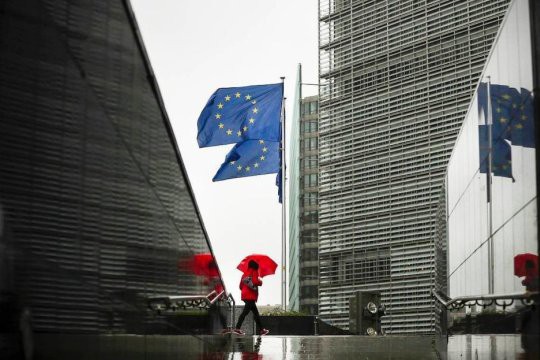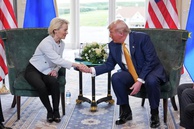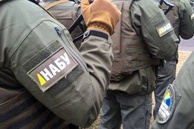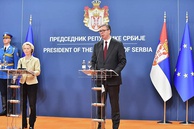Belgian Prime Minister Bart De Wever proved to be a tough and stubborn nut to crack. During the October 23 summit in Brussels, De Wever, much to the disappointment of European Union leaders, who eagerly awaited his official consent to "carve up" Russian money frozen in the accounts of Belgium’s Euroclear depository, did not dare to give it. Indeed, although Brussels had previously decided to use the accrued interest on these funds to support the Kyiv regime, this time it was about the deposited funds themselves, amounting to a whopping 70 or so percent of all foreign assets of the Russian Central Bank. The Belgian prime minister knows full well that international law does not allow such foolhardy tricks, because stealing someone else's property constitutes a theft, no matter how hard you try to veil it. Moscow has repeatedly reminded of this, threatening to file hard-hitting lawsuits, and this is the last thing the Belgian prime minister wants.
That being said, De Wever is certainly not against taking the risk of participating in such an unprecedented scheme. Feeling the pinch of the heavy cost of supporting Ukraine, EU countries have long been pushing Belgium to take this step and back in early September, De Wever seemed almost ready to take it. During a similar, albeit informal, EU summit in Copenhagen, he reminded his colleagues that Belgium had been the first to raise the issue of Russia's money deposited in Euroclear as "the goose that lays huge golden eggs," which "must be given to Ukraine." The Belgian prime minister then assured that he, like everyone else participating in that meeting, "does not want this money to get back to Vladimir Putin." If only he had thought earlier about the genie he was letting out of the bottle! However, "a word once uttered cannot be unsaid," and now he has to find a way out.
In Copenhagen, Bart De Wever hastened to dot the i's and cross the t's, demanding equal collective responsibility from all EU member states for the seizure of Russian assets: "You too must be ready for this. Let's eat all the chickens, not just mine." The EU leaders then agreed to think it over before the Brussels summit. Brussels hoped that the option proposed by European Commission President Ursula von der Leyen's team – a 140 billion euro reparation loan for Ukraine from frozen Russian assets, but without their formal confiscation – was a good basis for discussion and would help reassure De Wever and all doubters. The idea was that, essentially, nothing would change regarding Russian funds, as "the debt to Russia remains at the same level." The Russian money frozen in Euroclear would simply be converted into a special EU debt contract with Ukraine, under which Kyiv is obliged to repay the loan only after Russia has paid it war reparations. It was also said that Russia “will still retain the right of claim against Euroclear, and this is very important."
However, at a closer inspection, what looked more or less worked out on paper quickly crumbled and the questions being asked by the cautious De Wever only multiplied. For example, what guarantees should other EU states provide to Belgium, how will their amounts be determined, where will the loan money go, and how free will Kyiv be to use it? If the guarantees for Belgium are to be secured by the budgets of the other EU member countries, then the European Commission needs to develop a solid legal framework to preclude a situation in which they would have to part with this money. And so on and so forth... The Brussels summit gave no answers to any of this.
Therefore, the Belgian premier put forward the following key conditions for using Russian assets for a reparation loan to Ukraine: all EU countries must share the risk with Belgium and guarantee that, if the money needs to be returned, they will contribute. Furthermore, Belgium will not take this step until the countries where Russian assets are also frozen, although in much smaller amounts, join Belgium's actions. This is much more complicated, although Russian funds are currently deposited also in France, Luxembourg, Germany, and other countries.
Bart De Wever regards the EU plan to seize Russian assets from Euroclear as being "existential" for Belgium where the government is already struggling to find money for its national budget.
"I have been negotiating for several weeks to find 10 billion euros," the prime minister complained. The scenario where Belgium might one day have to return the money that the EU wants to seize is unthinkable, he said. "Just imagine having to pay 180 billion euros, plus compensation for damages, next year or in two years’ time. That's complete madness," noted.
The participants in the summit all agreed that Belgium needs to be "secured," but few have so far offered any specific guarantees. French President Emmanuel Macron said that the technical details of risk sharing still need to be worked out, and promised that this would be done in the coming weeks. Polish Prime Minister Donald Tusk was equally reassuring: "We are trying to convince our Belgian friends that we are ready to create a mechanism of joint, pan-European responsibility."
As a result, they decided to put off the issue again until the next European Council meeting in December to give the Belgian government time to continue the necessary legal and technical work together with the European Commission. Notably, the use of Russian assets is now missing from the final declaration, with the Commission simply "invited to develop options for financial support for Ukraine as soon as possible." If 140 billion euros are indeed sent to Kyiv, it could be enough to meet Ukraine's needs for at least the next two years. Ideally, the EU expects to begin disbursing the loan to Ukraine already at the beginning of 2026, but due to the many problems that have surfaced, chances of this look slim, especially when European budgets are affected, which is the most sensitive issue for almost all EU countries.
Meanwhile, in their bid to "increase pressure" on Moscow, EU leaders adopted the 19th package of anti-Russian sanctions, which they considered a great success. After lengthy debates, they decided, among other things, to ban Russian LNG imports from 2027 - a move that previously seemed unthinkable for the European Union. Small doubt that the most objective measure of their "success" will soon be the emotional reaction of ordinary European consumers when they see new figures in their gas bills. It is worth mentioning the fact that the decision on the new package of anti-Russian sanctions came much easier for Brussels than on the reparation loan for Kyiv.
Meanwhile, this yet-to-be-issued loan is already being actively carved up within the EU. Hiding behind the European Council’s solemn wording in the final document where it "commits to meeting Ukraine's urgent financial needs for 2026-27, including in the area of military and defense efforts," is a struggle already going on among European leaders for the use of the loan billions in the interests of their national military-industrial complexes. For example, France, Germany and Italy would like to make provision of the loan conditional on Ukraine using it to buy weapons produced in Europe, thus ensuring a quick return of funds to their own defense industry. German Chancellor Friedrich Merz was the first to pitch the idea in a September article in The Financial Times.
"Such a comprehensive program should also contribute to strengthening and expanding the European defense industry," he wrote. Under pressure from Berlin and Paris, the summit’s draft resolution even included words about the "importance of strengthening the European defense industry" through the loan. Critics believe that such an approach smacks of hypocrisy, though. Realizing the true meaning of the proposal, several other EU members, including the Netherlands, Nordic, and Baltic countries, insist that Ukraine should feel free to spend the money according to its needs, including the purchase of US-made weapons. They argue that the “buy European” condition would deprive Kyiv of access to much-needed weapons, such as Patriot missile defense systems, which are only produced in the United States. Zelensky previously assured that in spending the loan Kyiv would prioritize the purchase of domestic and European products, but insisted on being able to buy American weapons as well. In short, the Europeans had calculated everything; the premature division of Russian billions was already in full swing, and, all of a sudden, a “hiccup” with De Wever, blowing their chance of making easy money!
Amid this premature division of "the skin of an unborn credit," European businesses that have not yet withdrawn their assets from Russia begin to worry. One such voice of alarm came from the German-Russian Chamber of Foreign Trade, based in Moscow and lobbying for the interests of German businesses in Russia. According the DPA news agency, the Chamber's chairman, Matthias Schepp, fears that the transfer of frozen Russian assets to Ukraine would invite retaliatory measures from Moscow, which could cost German companies over 100 billion euros previously invested there.
"Germany has invested more in Russia than any other country. Therefore, it stands to lose the most from the planned use of Russian Central Bank funds for arms purchases for Ukraine," Schepp said. He referred to German enterprises, such as Uniper and Wintershall Dea that have been placed under external management and whose accounts in Russia have been frozen. Matthias Schepp explained that even if German companies sold their businesses in Russia, they were still obliged to transfer the proceeds to their blocked Russian accounts. While access to these accounts is restricted, formally the money still belongs to German companies.
"It is not in the interests of Germany and its taxpayers to have these funds ending up in the Kremlin's treasury," Schepp emphasized. One would like to hear what Chancellor Merz has to say about this.
read more in our Telegram-channel https://t.me/The_International_Affairs

 11:16 28.10.2025 •
11:16 28.10.2025 •



























